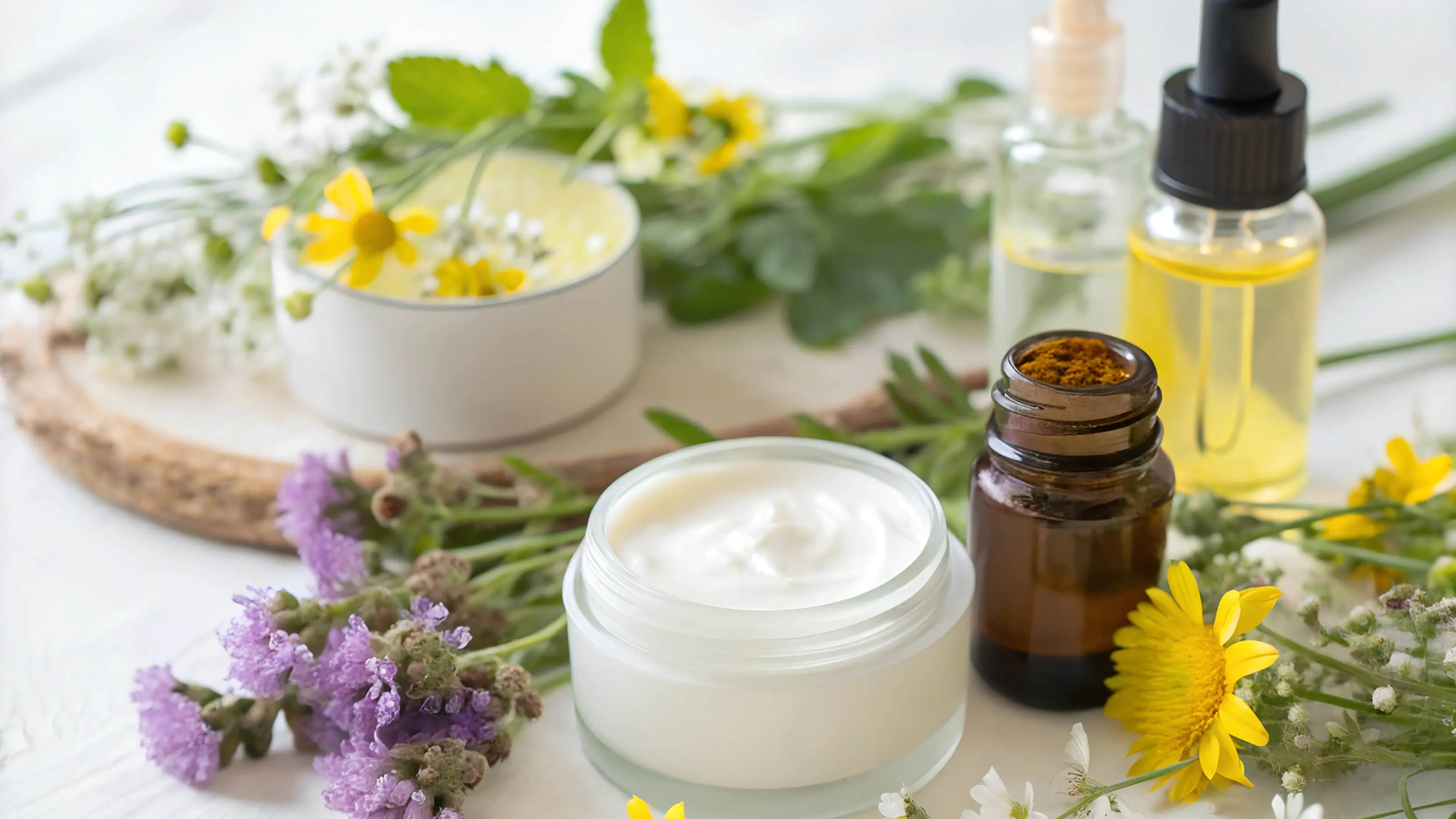
Beauty & Skincare
•04 min read
-9872eb55-9af0-4022-8644-bd8f05e8333e.png&w=3840&q=75)
Herbal remedies have been cherished for centuries as a natural way to boost skin’s radiance. In this blog post, we explore how herbal remedies can be your go-to solution for glowing skin. Get ready to learn the benefits of plant-based skincare, discover DIY herbal face masks, and understand how to incorporate organic skin care solutions into your daily routine.
Herbs hold powerful bioactive compounds that work naturally with your body. These include antioxidants that protect the skin from oxidative stress, vitamins that boost collagen production for improved elasticity, and essential oils that provide hydration and antibacterial benefits. Unlike synthetic formulations, herbal remedies mesh seamlessly with your skin’s natural processes, making them gentle and effective for daily use.
Antioxidants: Protect skin from environmental damage.
Vitamins: Enhance collagen production and skin firmness.
Essential oils: Hydrate the skin and fight bacteria.
Certain herbs have proven especially effective for skincare. For instance, chamomile helps to reduce inflammation and soothe sensitive skin, while aloe vera hydrates and repairs damaged areas. Turmeric brightens skin and fights acne, and lavender supports the skin with its calming effects. These herbal beauty treatments serve as a powerful alternative to chemical-loaded products, giving you a naturally healthy glow.
Homemade herbal face masks are a fun and cost-effective way to indulge in natural skincare remedies. Crafting these masks at home allows you to control the ingredients and enjoy fresh, botanical skincare products. Try these popular DIY herbal face masks:
Turmeric and Honey Mask: Combine turmeric powder with raw honey to brighten skin and reduce inflammation.
Aloe Vera and Green Tea Mask: Blend soothing aloe vera gel with antioxidant-rich green tea for hydration and natural anti-aging benefits.
Oatmeal and Lavender Mask: Mix ground oatmeal with a few drops of lavender essential oil to gently exfoliate and calm irritated skin.
Herbal steam treatments are a brilliant way to detoxify your skin. Adding herbs such as chamomile, rosemary, or mint to boiling water releases aromatic steam that opens your pores. This process allows herbal skin hydration treatments to deeply cleanse and rejuvenate your complexion. Shield your face with a towel over your head for a relaxing steam session that revitalizes your skin.
-5ba1f1f6-995b-4617-a1ff-43890351cff7.png&w=3840&q=75)
Acne-prone skin can benefit greatly from herbal acne treatments. The antibacterial and anti-inflammatory properties of certain herbs make them perfect for this purpose. Neem is renowned for its intensive antibacterial effects, tea tree oil helps reduce acne-causing bacteria, and calendula speeds up the healing process for stubborn acne scars. These natural skincare remedies offer a safer and gentler approach to battling acne compared to harsh chemical treatments.
Age gracefully with herbal ingredients that enhance collagen production and skin elasticity. Ginseng stimulates collagen formation, reducing the appearance of wrinkles, while rosehip oil, packed with vitamin C and fatty acids, helps maintain a youthful glow. Gotu kola is another potent herb that promotes skin firmness and diminishes fine lines, offering a holistic alternative to traditional anti-aging products.
Dry skin can be transformed with targeted plant-based skincare interventions. For a simple hydration boost, mix cucumber with aloe vera gel to lock in moisture. A refreshing rose water mist is perfect for a midday cooldown, and a dab of coconut oil provides deep hydration during colder months. Integrating these organic skin care solutions into your regimen can lead to visibly healthier, more supple skin.
Insight Corner: "Did You Know? Herbs Are Nature’s Multitaskers"
Many herbs, such as turmeric, work on multiple levels. They not only brighten the skin but also ease acne, reduce inflammation, and soothe irritation. Using herbs that serve various roles in your skincare routine can simplify your regimen while harnessing maximum benefits.
When selecting herbal beauty treatments, opt for products that are organic and sustainably sourced. Authentic botanical skincare products are free from synthetic additives. Always check for trusted labels, such as USDA Organic or cruelty-free certifications. This careful selection ensures that you invest in natural skincare remedies that are both effective and gentle on your skin.
Even though herbal remedies offer a natural alternative, skin sensitivity is still possible. Always perform a patch test on a small area before fully incorporating any new herbal product into your routine. If you have pre-existing skin conditions or particularly sensitive skin, consulting with a dermatologist is a smart move. Avoid mixing too many herbs at once, as this may dilute their benefits and cause unwanted reactions.

Shifting to organic skin care solutions is easier than you might think. Begin by replacing one or two items in your routine with herbal alternatives, such as DIY herbal face masks or a few drops of essential oils for skin. Gradually integrate more herbal remedies over time, allowing your skin to adjust and unlock the natural radiance it deserves. Embracing plant-based skincare can enhance your self-expression and promote a lifestyle that values simplicity and authenticity.
Chamomile, turmeric, aloe vera, and lavender are excellent for their soothing, brightening, and hydrating properties.
Yes, herbs like neem, tea tree oil, and calendula are highly effective in treating acne through their antibacterial and anti-inflammatory properties.
Most herbal remedies are gentle, but conducting a patch test is essential to avoid possible allergic reactions.
Using herbal face masks 2-3 times a week is ideal to maintain a healthy glow without over-exfoliating.
Yes, combining 2-3 compatible herbs can enhance their effects. However, avoid mixing too many at once to prevent irritation.
Herbal remedies provide a natural path to achieving glowing skin while addressing concerns like acne, aging, and hydration. By embracing DIY herbal face masks, understanding the science behind these botanicals, and gradually transitioning to plant-based skincare, you can enjoy healthy, radiant skin every day. Discover the beauty of holistic, organic skin care solutions and let nature reveal your natural glow.